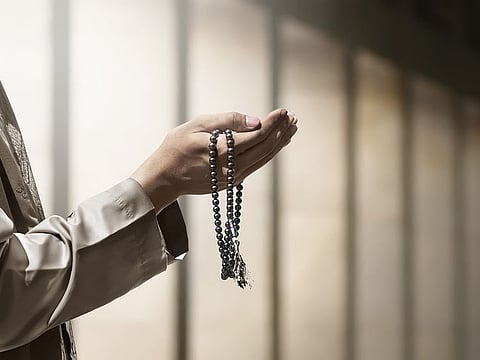Is it safe for COVID-19 survivors to fast during Ramadan?
Here is some advice from UAE doctors on the best way forward

Dubai: Is it safe for COVID-19 survivors to fast during Ramadan? Yes, of course, assure doctors in Dubai. However, it is always advisable that COVID-19 survivors go for a pre-Ramadan medical checkup under a physician’s advise and consult a pulmonologist and an internal medicine specialist before they decide on fasting.
The Centre for Evidence Based Medical Studies, University of Oxford, has stated that no research has indicated any adverse effect of fasting on COVID-19 survivors and assures such patients that they can fast during the entire month, under expert medical guidance and must make sure to take care of hydration, nutrition and sleep.

Take the case of Indian expatriate Jamal Abdul Nasir. The 60-year-old PRO with a multinational consulting company tested positive for COVID-19 in April 2020. For nearly a month, he was in the Intensive Care Unit (ICU) at LLH Hospital, Abu Dhabi, under the supervision of Dr Shehnaz P Abu, specialist pulmonologist, who was treating him for his lung fibrosis and delicate respiratory infections.
“That year, I was unable to fast as I was battling for my life. Even after I recovered, for nearly a month-and-a-half, I was dealing with severe chest infection, breathlessness and high blood pressure. I diligently kept my appointments with Dr Abu. She made sure to monitor my progress, putting me on medication to stabilise my blood sugar, blood pressure and other vital parameters, screening me once every three months with lung X-rays until I felt strong enough to observe the fast in 2021,” he said.
Once Nasir’s condition stabilised and he was able to establish a good daily routine, he could observe Ramadan during May 2021. “I kept all my fasts diligently and without any issue. However, I was careful to get my pre-Ramadan check-ups done. Moreover, I undergo a comprehensive medical check-up, once every three months. I am looking forward to keeping my fasts this Ramadan. I feel absolutely normal and motivated.”
Medical supervision
Speaking to Gulf News, Dr Adel Al Sisi, chief medical officer and consultant, Intensive Care, at Prime Hospital, said: “Observing a fast for the entire month is therapeutic as it can enhance the immune response of our body. However, COVID-19 survivors, especially those who suffered from moderate to severe symptoms might have had multiple organs affected by the virus and they must observe the fast only after undergoing investigative tests under the guidance of their physician.”

Dr Abu added: “Unlike earlier, we no longer have people with severe lung infections. Post COVID-19 recovery is quicker."

Top five complaints
Listing the top five complaints that patients have post-recovery, Dr Abu said: “Post-COVID recovery, patients have been coming to me with complaints of fatigue, muscle weakness, breathlessness, persistent cough, chest tightness, acid reflux and brain fog. In cases of respiratory complaints, I advise the patients to be regular with the screening of their chest, continue with medications throughout Ramadan and follow the advise of their physician with complete compliance to all instructions. This will help people observe their fasts with due diligence and care.”
Top 10 tips for COVID-survivors observing fast
Both Dr Al Sisi and Dr Abu encourage COVID-19 patients to fast. As such, long hours of fasting has proven to be therapeutic in detoxing the body and rebooting the system. COVID-19 patients can fast safely without any health emergencies provided they follow certain pre and post-fasting precautions. Their tips are as follows:
• Go in for pre-Ramadan health screening and assessment.
• Once the fasting begins, be mindful of taking your medications for ongoing complaints during Suhour and Iftar.
• Do not skip Suhour to avoid any acid reflux. Make sure to have plenty of fluids — coconut water, green tea, kefir, sugar free natural juices, soup to keep yourself amply hydrated. Avoid citrus fruits during the Suhour hours as that could trigger acidity. Choose fruit like apple and banana that are filling and can help manage acid levels.
• Choose nutritious food that have high natural fibre and low glycaemic index (GI) such as avocado, fresh fruit, nuts, seeds, healthy grilled or steamed fish, vegetables for Suhour and Iftar.
• Avoid fried, excessively spicy, oily or sweet food, processed items that can spike blood sugar and cause organ distress.
• Choose food from sources that come from beneath the earth. Food prepared from those that walk the earth (animal meat or dairy) needs to be used in moderation and food that are processed or refined should be consumed only sparingly.
• Once you end the fast during Iftar, replenish your nutrition gradually. End the fast with a glass of water and three dates. Then offer your prayers and return to have a cup of homemade vegetable or lentil soup with salad and nuts. For main course, choose only one animal source dish at one time and alternate it daily. For instance, have fish one day, chicken the next day, and beef the following day, accompanied with salads and low-carb accompaniments.
• Cut out sweets or limit them to very small portions.
• Go for a walk and establish a routine of some physical activity with deep breathing to maintain good respiratory health.
• Eating a balanced diet that replenishes macro and micro-nutrients, minerals and trace enzymes as well as following a de-stressed and restful routine will go a long way in helping one convalesce and recover well.
• Fatigue and muscle weakness are common complaints of COVID-19 survivors. Make sure to avoid strenuous work. When home two hours earlier, utilise it for pre-Iftar rest. After Iftar, make sure to retire early. Sleep can help patients heal better and reclaim their stamina.



